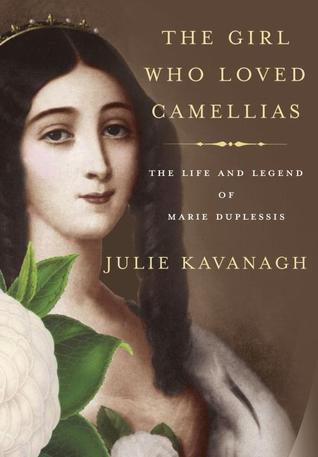 Marie Duplessis was the most admired young courtesan of 1840's Paris. A peasant girl from Normandy, she had reinvented herself in a matter of months, changing her name and learning how to dress, speak, and act like a duchess.
Marie Duplessis was the most admired young courtesan of 1840's Paris. A peasant girl from Normandy, she had reinvented herself in a matter of months, changing her name and learning how to dress, speak, and act like a duchess. "The little known, riveting story of the most famous courtesan of her time: muse and mistress of Alexandre Dumas fils and Franz Liszt, the inspiration for Dumas's The Lady of the Camellias and Verdi's La Traviata, one of the most sought after, adored women of 1840s Paris. Born in 1824 in Normandy, Marie Duplessis fled her brutal peasant father (who forced her to live with a man many years her senior). Julie Kavanagh traces Marie's reinvention in Paris at sixteen: as shop girl, kept woman, and finally, as grand courtesan with the clothes, apartment, coach and horses that an aristocratic woman of the time would have had. Tall, willowy, with dramatic dark hair, Marie acquired an aristocratic mien, but coupled with a singular modesty and grace, she was an irresistible figure to men and women alike. Kavanagh brings her to life on the page against a brilliantly evoked background of 1840s Paris: the theater and opera, the best tables at the cafés frequented by society figures, theater directors, writers, artists--and Marie, only nineteen, at the center of it all. Four years later, at twenty-three, she would be dead of tuberculosis."
Wow. This was a great biography of the courtesan who inspired The Lady of the Camellias and La Traviata. I read the biography right after reading the original novel, and that was a good choice. I was already immersed in the fictional world of Marguerite and Armand, and then I started reading about the actual woman, who was not quite as exalted as Dumas-fil's tragic heroine who sacrifices her chance at redemption. No, Marie Duplessis in the flesh was much harder than Dumas-fil's Marguerite or Verdi's Violetta.
Kavanagh writes really well; I was thinking about skipping the introduction, but it wasn't dry and uninteresting like introductions can sometimes be. On the contrary, I was immediately drawn into this compelling and fascinating story. It's pretty easy to get into, and Marie is a character one can easily sympathize with, fleeing from her awful circumstances and making a better life for herself. Her basic, basic story in terms of upbringing could be compared to Maude in Belle Epoque, but while Maude becomes a repoussoir, Marie became a courtesan, a high-class prostitute. And many influential men were her lovers, among them the composer Liszt, the director of the Paris Opera, and of course, Dumas-fils himself.
The book was engaging and very easy to get into; I was pleasantly surprised by the quality of the writing and the way this excellent biography was crafted. Kavanaugh provides a lot of detail, and the book seems to be meticulously well-researched. She describes how Marie's parents met, and how it quickly turned out that her father was a brute without straying too far from her subject. There's lush description too, and at times the book almost reads like a novel, as if Kavanaugh herself was transported back to the 1840's to witness Marie's life. It feels as if the reader has been taken back too. I could almost picture the sights and smells, particularly of Marie's early life and the time she lived with her kind-hearted cousins in the country. The whole first chapter of the book is in fact devoted to Marie (or Alphonsine's) early life before she arrived in Paris. It ends with her in Paris having "tangible proof of the luxuries her beauty could buy." In this first case, fried potatoes. Later, she convinces a young student to buy her some cherries. Marie's first time in Paris was spent in the Latin Quarter, where there were lots of students living cheaply.
Kavanagh writes for an intelligent and well-educated audience; there are some terms that she assumes the reader knows, and I liked that. She also does some reasonable interpreting while still sticking to the facts and not indulging in speculation. Often biographers tend to get carried away with an adoration or obsession with their subject; not so here because Marie was a complicated character, deeply flawed, at once sympathetic and very alien to the modern world.
This was an excellent biography, and I definitely learned a lot. I read it comparatively quickly for a nonfiction book; it wasn't overwritten or boring reading at all. Definitely recommended. I received a review copy from Knopf.
233 pages.
Rating: ****
No comments:
Post a Comment